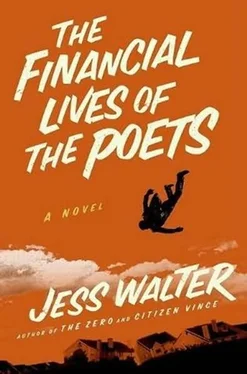“Hey. I’m trying to find Jamie and Skeet. Or the guy who drives that Festiva.”
“I don’t know what you’re talkin’ about,” the kid says, too fast, and I can see that I’ve spooked him.
“I’m not a police officer or anything. I just…I want to ask them something.”
The kid looks around, shifts in the glow of a streetlight, and then lowers his eyes. “You were here last night. Dude with the slippers.”
But Skeet has my slippers now, and I’m wearing running shoes, so I say, “Yeah, that’s me.” I don’t exactly remember this kid; they all kind of blurred together last night, because I’m so old or because I was so fried. “Look,” I say, and I step in close. “I just want to buy some of the weed we smoked last night.”
“And you’re not a cop?”
Remembering my upcoming Catholic training, I cross myself. “I swear.”
And maybe this kid was raised Catholic because this seems to convince him. He cocks his head and says, “How much you want?”
“Well,” and I take the $9,400 check from my pocket, “how about this much?”
The Last Days of the Newspaper Business
IDREAMED I WAS ON my bike, delivering the last paper
to the final porch and I tossed that rag at least a mile-
last dream of a democratic press-and the end of papers
fell like a snowflake onto the faded wood planks
of my old man’s porch, and he came out in slippers,
picked it up, slipped off the rubber band-and the thing
exploded with fresh despairs: new Vietnams and
Watergates, Mansons and Patty Hearsts, not to mention
Andy Capp and Hi and Lois, horoscopes, a Crossword puzzle,
box scores-even the obit of my poor mother. And
my old man told me not to cry, that even good things die,
son, and he folded that paper back up and tucked
the only good thing I ever did under his arm, easing back
into the warm house of my dead childhood to take
his morning shit.
The Last Days of the Newspaper Business, Part II
MY DREAMS TEND TO be either so obscure as to seem random, or so obviously connected to my subconscious that it’s embarrassing-as if even my hidden depths lack depth. When I was negotiating my severance from the newspaper, I really did dream one night that I’d delivered a paper to my own father, and that it contained my mother’s obituary. Of course, any good Freudian would accuse such a dreamer of ginning up his dream to please his therapist (this kind of behavior has a name like Stockholm Syndrome or Des Moines Disorder or something). But I swear: I really am that shallow.
Sometimes, in the same way one might try to piece together a fading dream in the morning, I’ll try to re-create the stupid chain of events that caused me to quit a solid newspaper job two years ago. The industry decline had already begun, of course, but I didn’t think for a moment that it would be fatal. I’d always assumed that, no matter what, I could just go back to the paper…that I could go home. It never occurred to me that a newspaper could die, any more than children think their parents will one day die. In fact, it was right around the time my mother passed away that I first began to feel the urge to leave my job. It felt like I was dying, like I was missing some opportunity to do something grand, something meaningful. Destiny. It felt like my creative soul was being suffocated by the cycle of writing for a newspaper, the slumping, slacking, always-behind feeling of being a news reporter. And then the stories themselves even seemed to shrink-pieces about this insurance company laying eighty people off…or that hospital joining a health consortium-as if there was a deflation of journalism’s ambition alongside its news hole.
But I never disliked my job. Worse (and it’s with great shame that I admit this), I took my job for granted. Worse yet, I never believed that my job was worthy of me. I thought of myself as more than a simple newspaper reporter, somehow better than the mean of my colleagues. I offer no excuses for this arrogance, and no rationale, either; I simply felt bigger than what I did for a living, like I was slumming, like I deserved more money, more respect and more esteem than any grubby newspaper could offer. I suppose it’s one of the reasons I became a business reporter in the first place. I preferred wearing suits (most reporters tend to dress like substitute teachers) and I liked swimming amid the sorts of fearless executives who made multi-million-dollar decisions the way the rest of us decided on a restaurant for lunch. When it became clear that Lisa and I had higher material aspirations than we could satisfy on the sixty-or-so-grand I could make as a journalist, I considered public relations for a time, but I’d always seen that as a pasture for old glue horses. So I began augmenting my salary freelancing stories to various national business magazines, and more significantly, I applied what I learned as a reporter to my own investing. And, Mexican shipping bonds aside, I did pretty well for a while. In
my best move, I managed a nice pivot from technology stocks to financials and media before tech blew up. In some years, I made nearly as much investing in the markets as I did writing about them. I even had a popular investing column for a couple of years, although, in the interest of full disclosure, this was during the late 1990s, when you could’ve trained a puppy on the newspaper stock section and made twenty percent a year investing where his turds fell.
It was also during this late ’90s entrepreneurial euphoria that my tumor of discontentment first began to replicate cells, as I sat chained to my desk and watched various friends and colleagues slip into phone booths and emerge as dot.com superheroes. It’s the devil’s taunt-watching people stupider than oneself making fortunes. Even when that bubble burst, I still told myself that my lack of ambition and imagination had cost me a chance at…I don’t know…wealth? Happiness? Some fulfillment of earlier promise?
Over the years, this tumor grew and metastasized until, by 2006, with my mother gone and my dad smoking his life away on a ranch in Oregon somewhere, with my own mortality throbbing, with the Dow climbing to its peak, with our house assessed at fifty percent more than we owed on it and my financials-heavy retirement account looking like an act of genius, with my marriage seemingly steady, the thing broke within me…and…
…I jumped. And landed. On poetfolio.com. It wasn’t that I believed I had some great talent as a poet. I knew my poetry was pedestrian and sentimental when I tried, silly and sophomoric when I didn’t. In fact, on top of the FAQ page of my prototype website was this little self-directed zinger by Alexander Pope:
Sir, I admit your general rule,
That every poet is a fool,
But you yourself may serve to show it,
That every fool is not a poet.
But I jumped anyway. I walked into my evil editor’s office (imagining the zingers I would deliver) and said simply that I was giving my two-week notice. Every working person fantasizes this moment, but it’s ultimately unsatisfying. I packed my desk into two boxes, took some files and…I jumped.
Splat.
Parked in front of the newspaper now, I wonder what would have happened had I not quit two years ago. I likely wouldn’t have been laid off, for one thing. My newspaper had a vague seniority-by-department layoff rule (which the evil editor took joy in manipulating and subverting, by transferring his enemies to departments he would then gut)- last one in, first one out -so while I had a total of eighteen years at the place, when the last round of layoffs came, they only counted the four months since I’d come back. But I’m not sure staying would have been much better; those four months were an anxiety-dream version of my old job: there was real fear in the air, a sense that this was more than some kind of business trend, that it was the end. Four years earlier we had complained about too many ads in the paper (less room for our brilliance) and competed for designer beats (cultural trends reporter); now we sighed with relief when the slender paper had any ads at all and eagerly accepted pay cuts and broad, hyphenated jobs created by the loss of our colleagues (courts-cops-schools…).
Читать дальше










